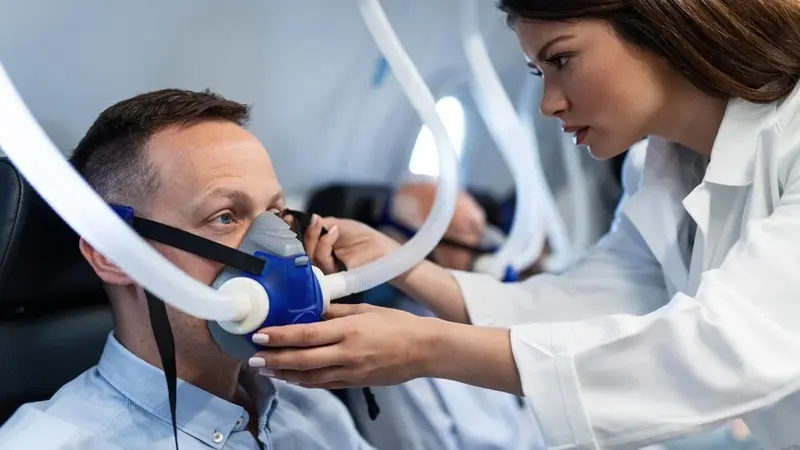Embarking on the journey to establish a respiratory therapy clinic is an ambitious endeavor that marries compassionate patient care with a keen entrepreneurial spirit. This comprehensive guide will navigate through the maze of design nuances, staff recruitment, and the labyrinth of legalities to lay a solid foundation for a thriving practice. Keep reading to unveil a treasure of insights and practical steps that will empower the launch and growth of your respiratory therapy clinic.
Creating a Welcoming Atmosphere: Design and Decor Tips for Your Clinic

Establishing a respiratory therapy clinic necessitates attention to detail, ensuring that the space is not only functional but also comforting. Given the stressful nature of healthcare environments, particular emphasis on design and decor can make a substantial difference in how patients perceive and experience their care. A thoughtful selection of colors, lighting, and furniture plays a critical role in forging a serene ambiance that promotes healing.
For a clinic where tranquility is paramount, the right choice of artwork can have a soothing effect, transforming stark walls into a gallery of calm. Pairing these visuals with a cohesive color scheme that favors soft blues, greens, or neutral tones can create a harmonious environment that helps alleviate patient anxiety. It’s about striking the perfect balance between clinical efficiency and homely comfort to reassure and relax both patients and their families.
Incorporating faux trees into your clinic’s decor can enhance the calming atmosphere and bring a touch of nature indoors, making the space more inviting for patients and staff alike. These elements of greenery evoke the restorative qualities of the natural world, often lost in urban settings, especially within healthcare facilities.
The maintenance-free aspect of faux trees ensures the clinic remains both hygienic and aesthetically pleasing without the hassle of regular upkeep. To find the best options, a quick Google search for “faux tree indoor” can lead you to a variety of suppliers and styles.
To complement these natural design elements, investing in comfortable seating is vital, as it contributes significantly to a patient’s overall experience. Ergonomically designed chairs that support a variety of body types demonstrate a clinic’s commitment to patient care beyond medical treatment. The seating arrangement should also facilitate conversation and interaction, fostering a sense of community among patients coping with similar health challenges.
Building a Team of Qualified Respiratory Therapy Professionals

The cornerstone of establishing a successful respiratory therapy clinic rests on assembling a proficient team. Clinical outcomes and patient satisfaction often hinge on the expertise and dedication of your staff.
Recruiting licensed respiratory therapists who demonstrate a robust knowledge base, coupled with a passion for patient care, will distinguish your clinic in the healthcare market. Their adeptness at handling complex respiratory cases will become one of your facility’s most celebrated assets.
Consider staff who have advanced their education, perhaps by acquiring a master’s in respiratory therapy, to ensure a high level of expertise within your clinic. Such credentials are a testament to a commitment to the field and signal a readiness to tackle the nuanced challenges of respiratory care.
Empowering your team through ongoing education will keep your clinic at the forefront of respiratory therapy advancements. Continuous professional development encourages a culture of excellence and innovation, benefiting both staff and the populations they serve.
Navigating Legal and Regulatory Requirements: Ensuring Compliance and Success
Launching a respiratory therapy clinic involves a meticulous understanding of the regulatory framework governing healthcare services. Prospective clinic owners must secure all necessary licenses and certifications before opening their doors to patients, ensuring adherence to state and federal guidelines.
Compliance with the Health Insurance Portability and Accountability Act (HIPAA) is non-negotiable for maintaining patient privacy and information security. Clinic operators should establish robust protocols and employee training programs to safeguard against breaches and uphold standards of confidentiality.
Quality control is essential, not only for patient safety but also for clinic credibility. Regular audits of therapy procedures, equipment maintenance, and staff performances ensure the clinic operates at the pinnacle of professional standards, ready for inspections at any moment.
Lastly, staying informed about changes in healthcare policies, such as updates to billing practices or insurance reimbursements, can prevent financial discrepancies. Successful clinic management requires a proactive approach to legal and regulatory shifts in the healthcare landscape.
Altogether, creating a successful respiratory therapy clinic requires a harmonious blend of thoughtful design, skilled professionals, and rigorous compliance with regulatory standards. By focusing on these key areas, you can build a thriving practice that offers exceptional patient care and stands out in the healthcare field.




